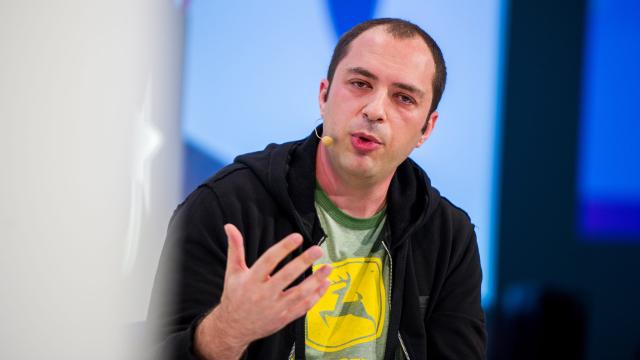Jan Koum, the billionaire CEO of Facebook subsidiary WhatsApp, is leaving the company following disputes over “the popular messaging service’s strategy and Facebook’s attempts to use its personal data and weaken its encryption,” The Washington Post reported today.
Jan Koum in 2014. Photo: AP
Koum will additionally step down from Facebook’s board, and was in the process of informing other senior executives at the company that he was on the way out when the Post contacted him. As the paper pointed out, Koum’s decision removes one of Facebook’s key players from the board:
Koum’s exit is highly unusual at Facebook. The inner circle of management – and the Board of Directors – have been fiercely loyal during the scandals that have rocked the social media giant. In addition, Koum is the sole founder of a company acquired by Facebook to serve on its board. Only two other Facebook executives – Zuckerberg and Chief Operating Officer Sheryl Sandberg – are members of the board.
In a post, Koum wrote he was leaving to pursue such relatable activities as “collecting rare air-cooled Porsches, working on my cars and playing ultimate frisbee”.
But the timing of the move is curious to say the least, given Facebook is currently undergoing internal strife and external scrutiny over the company’s desire to gobble up everyone’s personal data and sell it to advertisers. WhatsApp has also seen increasing criticism (and intervention by French regulators) after the encrypted chat service began sharing user data with Facebook in 2016.
According to the Post, Koum and WhatsApp co-founder Brian Acton grew tired of Facebook’s relentless march towards integrating WhatsApp user data into advertising profiles – in defiance of promises made during the acquisition process that the company would remain independent. Where once WhatsApp generated money via cheap $US0.99 subscriptions, it now feeds information such as phone numbers and contacts into Facebook, generating revenue but undermining the service’s original purpose and security.
Acton had already left in November, donating $US50 million ($60 million) to competing chat service Signal and telling people to delete Facebook.
The Post added that Koum was especially concerned that Facebook was integrating new business services into WhatsApp, as well as that it might weaken the app’s end-to-end encryption in order to mine more user data. (Just look at Onavo, Facebook’s version of a VPN, which actually watches everything users do online even when they’re not using it.)
Mark Zuckerberg responded with his own comment on Koum’s post saying he was “grateful for everything you’ve done to help connect the world, and for everything you’ve taught me, including about encryption and its ability to take power from centralised systems and put it back in people’s hands. Those values will always be at the heart of WhatsApp.”
Koum’s decision to quit comes amid still-brewing fallout of the Cambridge Analytica mess, where a third-party app allegedly used Facebook’s advertising tools to scrape profile information on at least 87 million people without their consent, then shared it with an electoral firm that worked on Donald Trump’s US presidential campaign.
But it also comes at a time when Facebook has become the de facto gateway to the internet in much of the world, including the more than 100 million people connected to its walled-garden service for developing countries, which comes with WhatsApp. The chat service reportedly has a billion users of its own, so whichever direction Facebook takes it will help shape how hundreds of millions of people across the planet communicate online.
If that sounds ominous, it should – the more one learns about Facebook’s business model, the less appealing letting it run so much of the online world sounds. For millions, it could be the difference between whether they are able to securely communicate or whether Zuckerberg and crew will always be listening in.
As noted by BuzzFeed News‘ Ryan Macc, the decision also prunes one of Donald Trump’s last supporters in the upper echelon of Facebook’s managerial structure.
With Koum out, regardless of whatever “values” Zuckerberg touts will always be inherent in WhatsApp, Facebook’s path is clear to monetise even more of the service. According to the Post, many remaining employees are “demoralised” and waiting to bail until November, when they will be allowed to exercise all their stock options.
